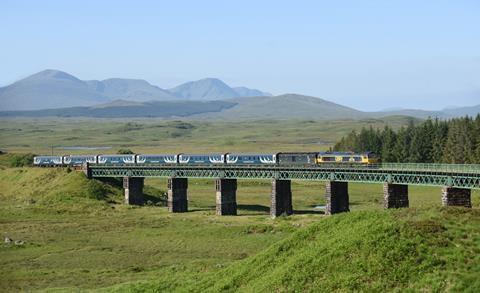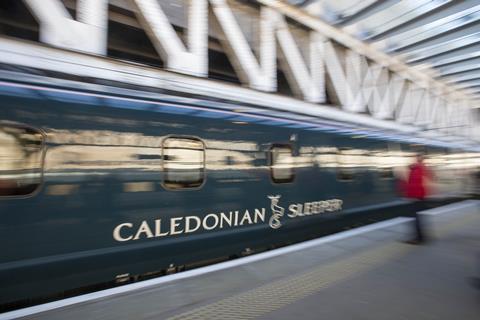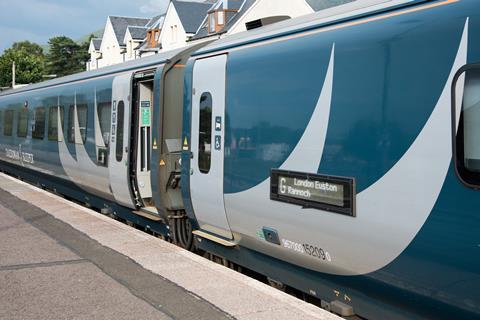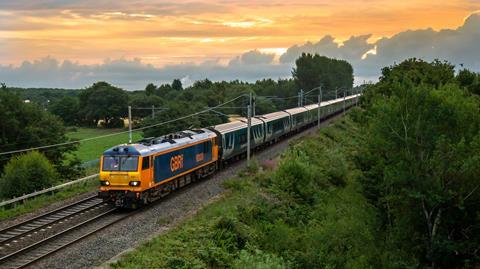
UK: The first Caledonian Sleeper night train services under Scottish government ownership ran on June 25, following the end of the contract previously held by Serco.
The last Serco Caledonian Sleepers Ltd trains ran on the night of Friday June 23, as there is no Saturday service on the overnight routes between London and various destinations in Scotland.
There are no changes to the services, fares or bookings under the new structure.
Contract ends

The contract held by Serco started in 2015 and was due to run to 2030. It included the replacement of the coaches with a new design from CAF at a cost of £100m, £60m of which was funded by a grant from the Scottish government.
The operation of the service is reported to have resulted in losses of around £69m; accounts to March 31 2022 show a loss of £3·0m, following a loss of £3·9m the previous year when post-Covid recovery was still affecting revenue.
The loss came despite an increase in ticket sales to £21·2m, a significant improvement on the £5·7m at the peak of the pandemic in 2020-21; support from Transport Scotland fell from £48·1m the previous year to £35·9m in 2021-22, adding to Serco’s difficulties.
The contract included a ‘rebase clause’ whereby after seven years Serco could propose alternative financial arrangements for the remaining years, with the operator having the option to exit the contract if an agreement could not be reached.
Discussions over the level of taxpayer support needed failed to reach an agreement, and in October 2022 the Scottish government announced that the contract would end in June 2023.
Commenting on the end of the contract, John Whitehurst, Managing Director of Serco’s transport business, said ‘during the eight years since Serco’s inaugural services departed, we have brought about massive improvements to every aspect of the service for our employees, our passengers and for Scotland, despite having made significant losses on the contract’.
He added that ‘we hand the Caledonian Sleeper over to the Scottish government in great shape, secure in the knowledge that this is now a world class service that represents the best of Scotland’.
Caledonian Sleeper Ltd

The service is now operated by Caledonian Sleeper Ltd under the direction of Scottish Rail Holdings Ltd, the Scottish government-owned arm’s length body which has overseen ScotRail services though ScotRail Trains Ltd since April 2022.
Scottish Minister for Transport Fiona Hyslop said the decision to adopt an operator of last resort arrangement ‘followed an extensive review and consideration of the options available’, including the possibility of directly awarding Serco a new contract which was considered but rejected.
Hyslop said ‘this review was conducted against the background of substantial uncertainty regarding future market conditions and the pace and impact of the UK government’s rail reform process’.
Staff have transferred across on their existing terms. ‘It is fitting that we recognise the successes of the staff and management at the Caledonian Sleeper who have transformed this service’, said Hyslop, who gave ‘my reassurances that there is a continued role for them to play’.
She said ‘in recent years, the Caledonian Sleeper has flourished, with increasing numbers of people using its unique journey opportunities. The service plays an important role in showcasing the best of Scotland and I look forward to building on that success in the years to come.’
Haulage contract

GB Railfreight has been awarded a seven-year contract to continue hauling the services using Class 92 and Class 73 locos with Dellner couplers that allow coupling to the CAF MkV coaches.
GBRf said the agreement ‘remains in line with’ its original 15-year contract with Serco. The length of the agreement offers it the opportunity to consider using the Class 99 electro-diesel locomotives on order from Stadler Valencia which would offer ’a significant reduction in the volume of carbon created by the service’.



